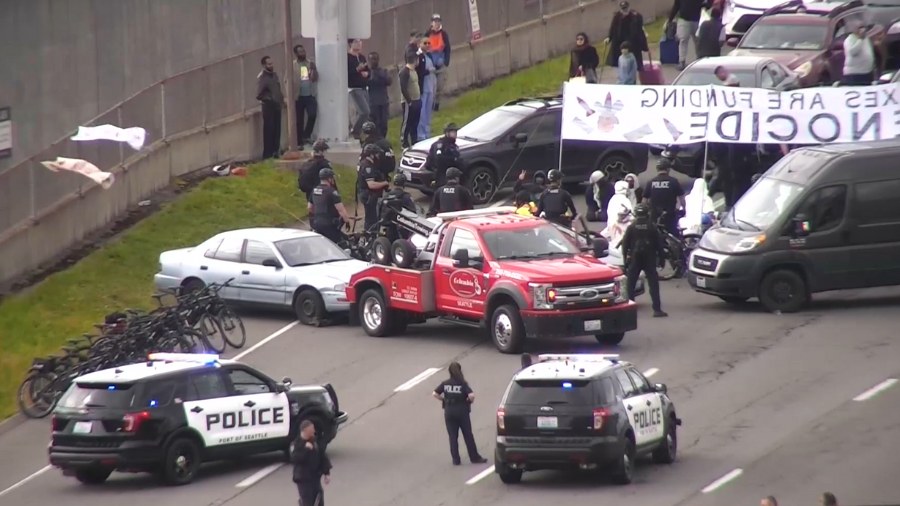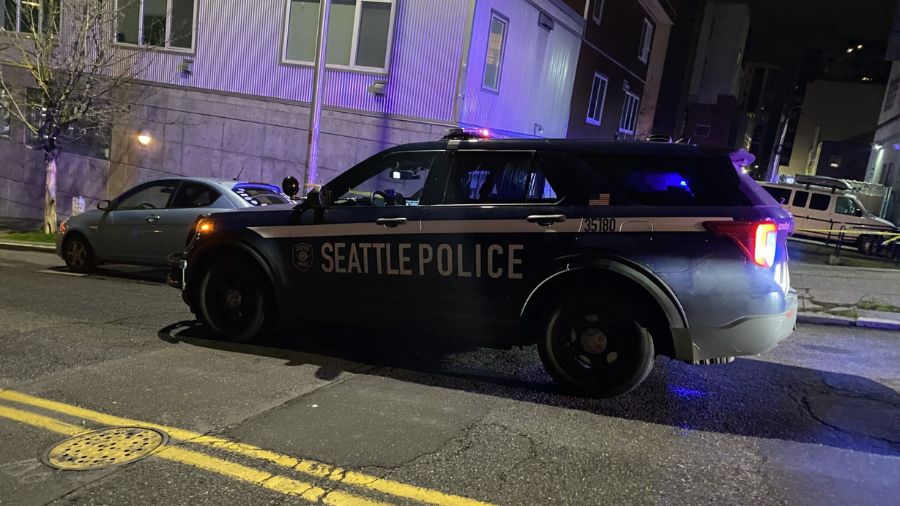Former director of 911 center says ‘start cutting fat’ from SPD budget
Jul 14, 2020, 5:09 AM | Updated: 6:51 am
Seattle Mayor Jenny Durkan and Police Chief Carmen Best announced their own plan for reworking the city’s police budget Monday, which includes moving roughly $76 million in services out of the Seattle Police Department’s budget for 2021.
Mayor Durkan, Chief Best lay out proposal for ‘reenvisioning’ of SPD’s budget
Retired police commander and former director of the SPD 911 center, Greg Schmidt, reached out to KIRO Radio’s Gee & Ursula Show prior to the mayor and chief’s announcement, acknowledging that “change needs to happen.”
“Well, did the council get the mayor and the chief’s attention? Yes,” Schmidt said after Monday’s announcement. “They have their attention. They had our attention. So that was my first reaction when I hear $76 million being cut, proposed to be cut, next year, which is about 20%, not the 50% that the Council recklessly is asking for.”
That 20%, Schmidt said, is still significant, and would not have happened without pressure from the Seattle City Council.
Start cutting the fat
Schmidt has created his own list of ideas for cuts within the police department and at the 911 center that he believes could be an easy fix and would save money.
“My first thing is, you actually start with a line item budget, and you start cutting fat. There’s fat. And people in the department can tell you there’s fat, but they’re not necessarily the people with any influence,” Schmidt said. “So I encourage those people to start speaking up, get to the chief, get to the mayor, and get to the council, and start identifying individual areas where they think there’s fat.”
Cuts should “absolutely” include overtime, Schmidt said.
“I do not fault the workers who work the overtime. Yes, there are some that abuse it, yes. But for the vast majority, that is not the case,” he said. “Look at the lieutenants, the captains, and the chiefs that are authorizing the overtime.”
There are millions budgeted for overtime, which Schmidt says is an amount that could be cut back.
Unions are not the problem
Schmidt also does not believe police unions are the problem, but rather says it’s some leaders within the unions and within SPD who are “the roadblock” to change.
“The unions are not the problem in general. It’s a collective bargaining agreement, it’s a contract we have to follow. The citizens are going to pay the bill no matter what … the collective bargaining agreement says, but also any mistakes or violations of it. So I’m OK with unions and the negotiation.”
There are at least 10 different unions at the table in certain situations, he said.
“There’s a lot of negotiation that goes on. I have seen chiefs, captains at the table, City Attorney’s Office people that are supposed to be defending what SPD needs and what the citizens are willing to pay for, and I see them just getting railroaded over by individuals on the other side of the table,” Schmidt said.
“… And it’s not a needs analysis that’s being done, as to what SPD needs, the citizens need, and how the unions can accomplish it,” he added. “It becomes a money grab.”
Fixing the accountability problem
There’s a lot of talk about accountability. So what can Seattle do better about the accountability of police officers?
“Look who we promoted,” Schmidt answered. “Are we rewarding the right behaviors when we promote? Are we rewarding the right behaviors when we dish out overtime — which for many officers and workers, they love the overtime — are we rewarding the right kind of behavior when we hand out that overtime? I’d argue we’re not.”
He said there are examples that exist where the wrong people have been promoted, and the wrong behaviors supported.
“We talk about accountability, what’s going on in the news, the tragedy of the George Floyd, the criminal act of the killing of George Floyd, there’s other acts like that, and that’s getting the attention, and that needs to change, of course, but I want to look at the others,” he said. “Who are the supervisors, lieutenants, the captains, the chiefs that oversee these people? Are we holding them accountable for holding their troops accountable?”
Former WA sheriff: Police reform requires culture change, accountability
As we look ahead to what it is that everyone can do to change this situation where there is injustice or “bad cops,” what can we do to make it easier for those cops to truly be removed from the department?
Personally, Schmidt says he’s ready to remove arbitration from the process, though added that it can’t be removed unilaterally by the chief.
Schmidt also said he supports a chief or a union president standing by one of their members who have been accused of a crime.
“I don’t have a problem with that. I consider them a victim advocate at that stage of the game, they’re a union member, and they deserve their rights,” he clarified. “But that union that’s representing and supporting their troops thinking of them as a victim advocate. And that’s only one part of the criminal justice equation.”
“The chief could make statements, the mayor could make statements, the council. Individual members of department, really can’t make statements,” he said. “Us retired people can. People who have family in law enforcement can. So we can talk and we need to keep speaking.”
Cuts for the 911 center
The 911 center, Schmidt says, could also see cuts, some of which could be made today by the chief without any other direction or authority. He provided one example.
“You have a sworn lieutenant and a sworn captain/director running the 911 center, that’s part of the Seattle Police Management Association. Back when I was in charge, we got rid of the five sworn sergeants out of the 911 center legally, properly, with union negotiations. Two years later, they’re out, and we had civilians take their place,” he recalled. “That was a success story.”
This could be done with the lieutenant and caption, too, Schmidt said, adding that “95% of all the other call centers around the country do not have sworn lieutenants and captains” in their 911 call centers.
“Other people go through call taking, dispatching, supervising, that work — they’re the lieutenants. They’re the managers and directors of 911 centers,” Schmidt said. “So there’s easy cuts right there.”
In total, Schmidt came up with almost $35 million in cuts that he thinks could be accomplished in 2021.
Listen to the Gee and Ursula Show weekday mornings from 9 a.m. – 12 p.m. on KIRO Radio, 97.3 FM. Subscribe to the podcast here.













